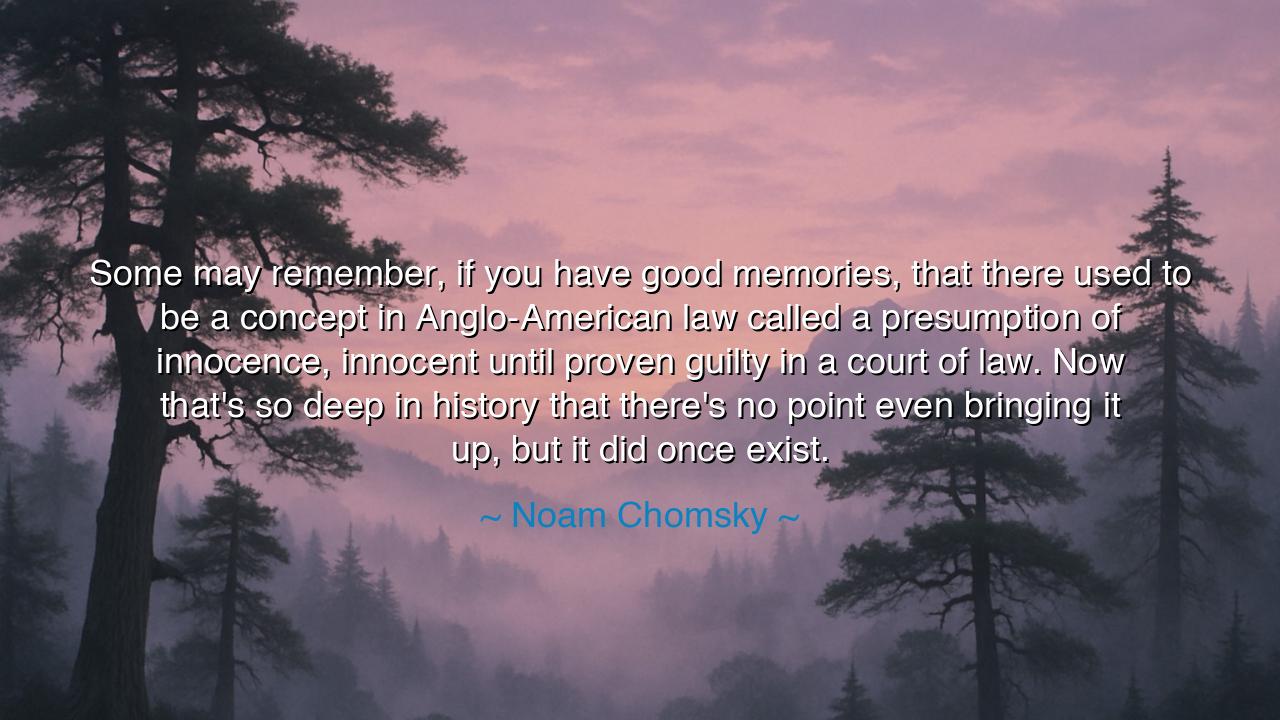
Some may remember, if you have good memories, that there used to
Some may remember, if you have good memories, that there used to be a concept in Anglo-American law called a presumption of innocence, innocent until proven guilty in a court of law. Now that's so deep in history that there's no point even bringing it up, but it did once exist.






“Some may remember, if you have good memories, that there used to be a concept in Anglo-American law called a presumption of innocence, innocent until proven guilty in a court of law. Now that’s so deep in history that there’s no point even bringing it up, but it did once exist.” Thus spoke Noam Chomsky, the tireless scholar and critic of power, in a tone both mournful and cutting. His words are not merely a commentary on law—they are a lament for the decay of justice, for the erosion of one of civilization’s most sacred principles. He speaks not only to lawyers and judges, but to all who care for the moral architecture of human society. His warning is ancient in spirit: that when truth is forgotten and fairness forsaken, even the brightest empires begin to crumble from within.
The presumption of innocence—this simple yet profound idea—was once the cornerstone of justice in the Western world. It proclaimed that no man or woman should be condemned by rumor or accusation alone, but only by proof beyond doubt, and only through lawful process. It was born not from mercy alone, but from wisdom: for the ancients knew that the power to punish, once unrestrained, becomes the power to destroy the innocent. To presume innocence is to uphold human dignity—to believe, even in the midst of suspicion, that every soul deserves fairness before judgment. But as Chomsky reminds us, that noble presumption, once etched into the conscience of nations, has begun to fade like a forgotten scripture.
Chomsky’s words are laced with irony, for he speaks as one who has witnessed the twisting of law into an instrument of convenience. In his lifetime, he has seen governments wage wars under false pretenses, imprison the weak while the powerful go free, and condemn individuals not through courts but through the court of public opinion—that vast and restless mob of modern life. In such a world, guilt is often declared before evidence is weighed; reputations are destroyed before facts are known. What was once a sacred process has become a spectacle. Thus, when Chomsky says the presumption of innocence “did once exist,” he is not exaggerating. He is mourning its loss in practice, even if it survives in name.
History, too, provides its dark reflections of this truth. Consider the Salem witch trials of the seventeenth century—an age when fear and superstition replaced justice. Innocent women and men were accused without proof, their fates decided by hysteria, not by evidence. They were declared guilty until they could prove themselves otherwise, and many perished in the flames of collective panic. Yet even centuries later, in the age of reason and technology, humanity continues to repeat this pattern in subtler forms. The new witch hunts occur not in churches or courts, but on screens and social platforms; verdicts are issued not by judges, but by crowds. Chomsky, the modern sage, sees in this the same ancient peril—the triumph of emotion over reason, of accusation over truth.
In speaking thus, Chomsky channels the timeless warning of the philosophers and prophets: that justice must be protected not only by laws but by culture—by the discipline of thought, the courage to doubt, and the restraint to wait for truth. For what is civilization, if not the long struggle to rise above vengeance? The presumption of innocence was one of humanity’s greatest achievements because it demanded self-control; it required society to think before striking, to reason before condemning. To lose it is to return to the primitive, to the age when the loudest voice decided guilt and the sword replaced the gavel.
And yet, even in his cynicism, there is in Chomsky’s words a quiet call to remember. When he says “if you have good memories,” he is not merely speaking of recollection but of moral remembrance—the kind that awakens conscience. For memory is not nostalgia; it is resistance. To remember justice when others forget it is to keep its flame alive. Just as monks once preserved the wisdom of ages through dark centuries of ignorance, so too must modern minds preserve the memory of fairness in a world that trades truth for convenience.
Let the reader, then, take this as both warning and command: do not forget the sacred order of justice. When you hear accusation, ask for evidence. When you hear outrage, ask for truth. When you hear condemnation, ask for understanding. Refuse to join the mob that delights in destroying what it does not know. For to presume innocence is not to excuse evil, but to protect goodness—to ensure that the sword of judgment is guided by reason, not rage.
Thus, Chomsky’s lament becomes our lesson. The presumption of innocence may seem old, even naïve, but it remains the shield of the free and the mirror of the just. When societies abandon it, they no longer punish the guilty—they persecute the unlucky. But when they remember it, even their laws become acts of compassion, and justice itself becomes an art of truth. May we, then, keep this memory alive—not as relics of a lost age, but as guardians of the light that still flickers in the heart of law and conscience alike.






AAdministratorAdministrator
Welcome, honored guests. Please leave a comment, we will respond soon